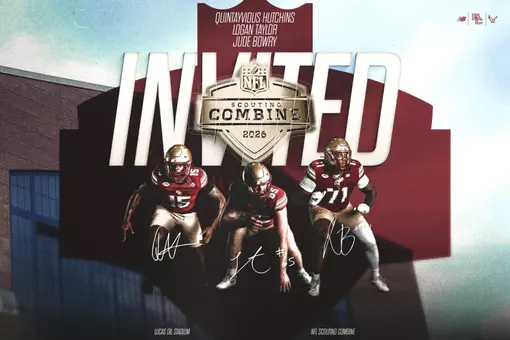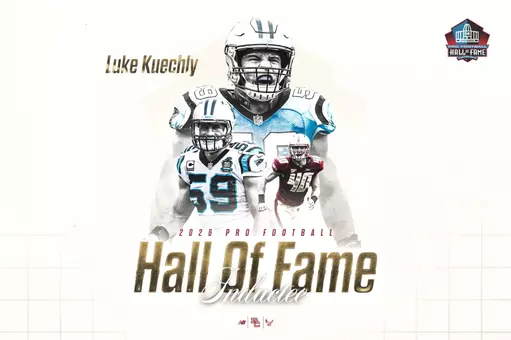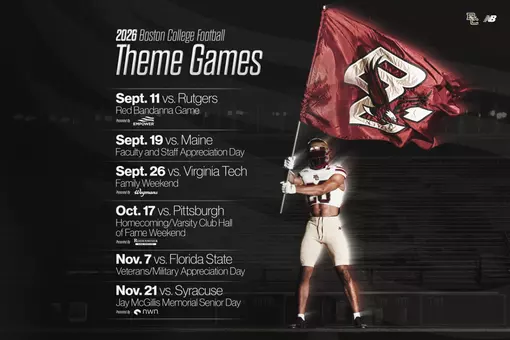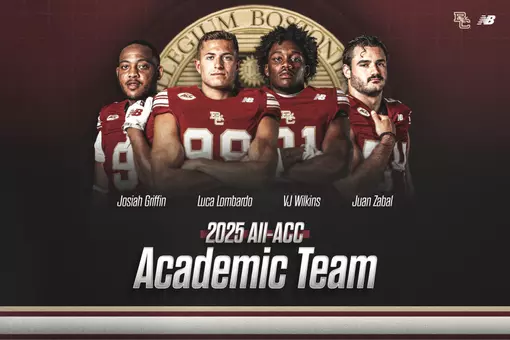Boston College Athletics
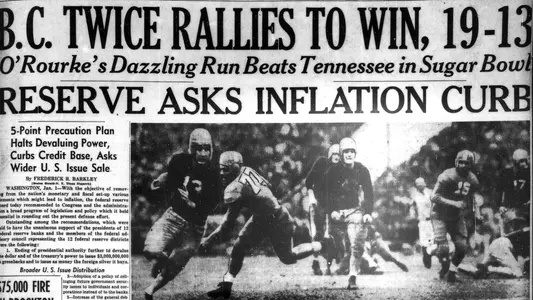
The 1940 Team of Destiny
November 10, 2015 | Football
The Eagles celebrate the 75th anniversary of a perfect championship season
By Reid Oslin
Perhaps no football team in Boston College history has surpassed the achievements of the storied 1940 Eagles - now celebrating the 75th anniversary of a magnificent season when BC was undefeated (11-0); won the 1941 Sugar Bowl by conquering previously unbeaten Tennessee on New Year's Day; and staked a rightful claim to at least a share of the 1940 National Championship.
Coached by future College Football Hall of Fame honoree Frank Leahy, the 1940 Eagles were the toast of Boston – and the nation – for their outstanding and exciting play. After Eagle halfback "Chuckin' Charlie" O'Rourke – another future Hall of Fame inductee – scored the winning touchdown late in the game against Tennessee, it set off a wild celebration in Boston and beyond. Days later, more than 100,000 fans jammed Boston's South Station to welcome home their beloved and victorious Eagles and to revel in the team's perfect championship season.
Or was it really a championship season for the Eagles? Some naysayers – including those who a) don't have a whit of knowledge about college football, and/or b) who obstinately refuse to acknowledge BC's athletic success – sniff that the 1940 national football crown was captured by the University of Minnesota, a team that was also unbeaten (8-0), but did not participate in a post-season bowl game, or Stanford (10-0), another squad with an unblemished record that defeated seventh-ranked Nebraska in the January 1 Rose Bowl.
So who really earned the 1940 national championship crown?
The 1940 season was indeed a glorious one for the Eagles and their fans. In the second game of the year, Leahy brought his team to New Orleans where they defeated a strong Tulane team, 27-7, the worst loss of the season for the Green Wave. BC demolished Auburn, 33-7, in a game played at Fenway Park, and then edged previously-unbeaten and nationally-ranked Georgetown by a 19-18 score in a contest that legendary sportswriter Grantland Rice termed "by all odds, the best college game I ever saw."
Led by O'Rourke, All-America fullback Mike Holovak and many others, Boston College topped the nation in scoring that year with 320 points. The Eagles were the unanimous choice for the 1940 Lambert Trophy, presented to the best team in the East.
In those "golden days" of college football – long before the arrival of ESPN, sports talk radio, college football playoffs and interactive fan blogs – the final Associated Press poll was taken at the end of the regular season, not after the post-season bowl games. The final AP poll of the 1940 season was published on December 2 and listed Minnesota as the nation's No. 1 team. The Gophers never played another game that year.
Stanford completed their Pacific-8 season undefeated and was ranked second in the AP listing. The then-Indians from Palo Alto went on to top Nebraska (8-2) in the Rose Bowl on New Year's Day.
Michigan took the third spot in the 1940 AP poll with a 7-1 record. The Wolverines also declined to play in a bowl game that year.
Undefeated Tennessee placed No. 4 in that "final" AP poll, but then lost to No. 5 Boston College by a 19-13 score in the Sugar Bowl game on January 1.
Prior to the loss to BC, Tennessee actually had the strongest claim to the national title - having outscored their regular-season opponents 319-19 and beating such worthy foes as Alabama, Florida, LSU, Kentucky, Virginia and Duke. To this day in some precincts in the Volunteer State, some Tennessee fans feel that the Vols were the nation's best team 75 seasons ago.
Since 1965, AP and other poll sponsors have waited until all bowl games were played before issuing a final ranking.
The NCAA also took no role in determining a national football champion in that era, leaving the final selection to the newspapers, magazines and radio outlets that devoted enormous coverage to college football, baseball and horse racing - and offered virtually no nod to the upstart National Football League or other pro sports organizations.
Boston College, Minnesota and Stanford were all crowned as "National Champions" by various media outlets – and each school has a case for the right to fly the 1940 championship banner. In the East and South, sentiment was strong in favor of the Eagles: the sports editor of the New York Herald Tribune wrote that the victory over Tennessee "entitled Boston College to be the undefeated champions of the United States."
Twenty-five years after the Sugar Bowl game, in 1966, The Boston Globe sponsored a gala downtown honoring the declared 1940 National Champions
In future years, Leahy, O'Rourke, Holovak, end Gene Goodreault, guard George Kerr and center Chet Gladchuk were all inducted into the prestigious National Football Foundation's College Football Hall of Fame. By contrast, Minnesota and Stanford had but three Hall of Fame inductees apiece (Sonny Franck, Bruce Smith and Dick Wildung for the Gophers; and Stanford's Frankie Albert, Hugh Gallarneau and Chuck Taylor.)
Who really won the 1940 title is likely a question that will never be fully answered or resolved. But now – 75 years later – let's all raise our glasses and our voices to a National Championship pennant that can fly proudly and rightfully in Chestnut Hill.
Perhaps no football team in Boston College history has surpassed the achievements of the storied 1940 Eagles - now celebrating the 75th anniversary of a magnificent season when BC was undefeated (11-0); won the 1941 Sugar Bowl by conquering previously unbeaten Tennessee on New Year's Day; and staked a rightful claim to at least a share of the 1940 National Championship.
Coached by future College Football Hall of Fame honoree Frank Leahy, the 1940 Eagles were the toast of Boston – and the nation – for their outstanding and exciting play. After Eagle halfback "Chuckin' Charlie" O'Rourke – another future Hall of Fame inductee – scored the winning touchdown late in the game against Tennessee, it set off a wild celebration in Boston and beyond. Days later, more than 100,000 fans jammed Boston's South Station to welcome home their beloved and victorious Eagles and to revel in the team's perfect championship season.
Or was it really a championship season for the Eagles? Some naysayers – including those who a) don't have a whit of knowledge about college football, and/or b) who obstinately refuse to acknowledge BC's athletic success – sniff that the 1940 national football crown was captured by the University of Minnesota, a team that was also unbeaten (8-0), but did not participate in a post-season bowl game, or Stanford (10-0), another squad with an unblemished record that defeated seventh-ranked Nebraska in the January 1 Rose Bowl.
So who really earned the 1940 national championship crown?
The 1940 season was indeed a glorious one for the Eagles and their fans. In the second game of the year, Leahy brought his team to New Orleans where they defeated a strong Tulane team, 27-7, the worst loss of the season for the Green Wave. BC demolished Auburn, 33-7, in a game played at Fenway Park, and then edged previously-unbeaten and nationally-ranked Georgetown by a 19-18 score in a contest that legendary sportswriter Grantland Rice termed "by all odds, the best college game I ever saw."
Led by O'Rourke, All-America fullback Mike Holovak and many others, Boston College topped the nation in scoring that year with 320 points. The Eagles were the unanimous choice for the 1940 Lambert Trophy, presented to the best team in the East.
In those "golden days" of college football – long before the arrival of ESPN, sports talk radio, college football playoffs and interactive fan blogs – the final Associated Press poll was taken at the end of the regular season, not after the post-season bowl games. The final AP poll of the 1940 season was published on December 2 and listed Minnesota as the nation's No. 1 team. The Gophers never played another game that year.
Stanford completed their Pacific-8 season undefeated and was ranked second in the AP listing. The then-Indians from Palo Alto went on to top Nebraska (8-2) in the Rose Bowl on New Year's Day.
Michigan took the third spot in the 1940 AP poll with a 7-1 record. The Wolverines also declined to play in a bowl game that year.
Undefeated Tennessee placed No. 4 in that "final" AP poll, but then lost to No. 5 Boston College by a 19-13 score in the Sugar Bowl game on January 1.
Prior to the loss to BC, Tennessee actually had the strongest claim to the national title - having outscored their regular-season opponents 319-19 and beating such worthy foes as Alabama, Florida, LSU, Kentucky, Virginia and Duke. To this day in some precincts in the Volunteer State, some Tennessee fans feel that the Vols were the nation's best team 75 seasons ago.
Since 1965, AP and other poll sponsors have waited until all bowl games were played before issuing a final ranking.
The NCAA also took no role in determining a national football champion in that era, leaving the final selection to the newspapers, magazines and radio outlets that devoted enormous coverage to college football, baseball and horse racing - and offered virtually no nod to the upstart National Football League or other pro sports organizations.
Boston College, Minnesota and Stanford were all crowned as "National Champions" by various media outlets – and each school has a case for the right to fly the 1940 championship banner. In the East and South, sentiment was strong in favor of the Eagles: the sports editor of the New York Herald Tribune wrote that the victory over Tennessee "entitled Boston College to be the undefeated champions of the United States."
Twenty-five years after the Sugar Bowl game, in 1966, The Boston Globe sponsored a gala downtown honoring the declared 1940 National Champions
In future years, Leahy, O'Rourke, Holovak, end Gene Goodreault, guard George Kerr and center Chet Gladchuk were all inducted into the prestigious National Football Foundation's College Football Hall of Fame. By contrast, Minnesota and Stanford had but three Hall of Fame inductees apiece (Sonny Franck, Bruce Smith and Dick Wildung for the Gophers; and Stanford's Frankie Albert, Hugh Gallarneau and Chuck Taylor.)
Who really won the 1940 title is likely a question that will never be fully answered or resolved. But now – 75 years later – let's all raise our glasses and our voices to a National Championship pennant that can fly proudly and rightfully in Chestnut Hill.
BC Football Camp Report | Episode 6
Friday, August 22
Football: Offensive Coordinator Will Lawing Media Availability (August 21, 2025)
Thursday, August 21
Football: Special Teams Coordinator Matt Thurin Media Availability (August 21, 2025)
Thursday, August 21
Football: Defensive Backs Coach Cory Robinson Media Availability (August 21, 2025)
Thursday, August 21

